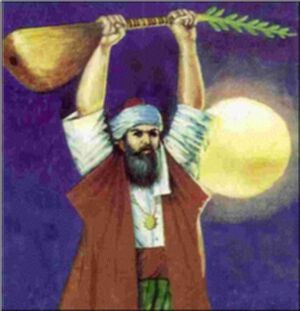Pir Sultan Abdal facts for kids
Pir Sultan Abdal (born Haydar) was a very important poet and religious leader in a group called Alevism. People believe he was from the Turkmen people and was born in a village called Banaz, which is now in Sivas Province, Turkey. He is seen as a legendary figure by his followers, almost like a hero from a story.
We learn about his life mostly from old stories and especially from religious poems. Many people believe he wrote these poems himself, and they were passed down by travelling musicians and storytellers called ashiks. However, it's sometimes hard to be completely sure if every poem attributed to him was actually written by him.
Contents
Who Was Pir Sultan Abdal?
Pir Sultan Abdal lived a long time ago, during a period when the Ottoman Empire and the Safavid Empire (in Persia) were often fighting. He was a strong voice for people who had different religious beliefs than the main ones at the time. He also spoke out against the government's power.
His Beliefs and Challenges
Pir Sultan Abdal was a leader in the Alevi faith. This faith had some different ideas compared to the main religion of the Ottoman Empire. Because he supported these different religious views and also challenged the government, he faced many problems. His actions were seen as a threat by the rulers of the Ottoman Empire.
Standing Up for His Beliefs
During the wars between the Ottoman Empire and Persia, Pir Sultan Abdal continued to speak his mind. He supported ideas that were not popular with the powerful leaders. Because of his strong beliefs and his courage to speak out, he was eventually put to death. He is remembered for standing up for what he believed in, even when it was dangerous.
His Legacy
Even though he lived centuries ago, Pir Sultan Abdal is still a very important figure today. His poems are still sung and read, and they inspire many people. He is seen as a symbol of courage, justice, and standing up for the truth. His life and his words continue to influence Alevism and Turkish folk culture.
See also
 In Spanish: Pir Sultan Abdal para niños
In Spanish: Pir Sultan Abdal para niños
- Alevism
- Kurdish Alevism
 | Aaron Henry |
 | T. R. M. Howard |
 | Jesse Jackson |


